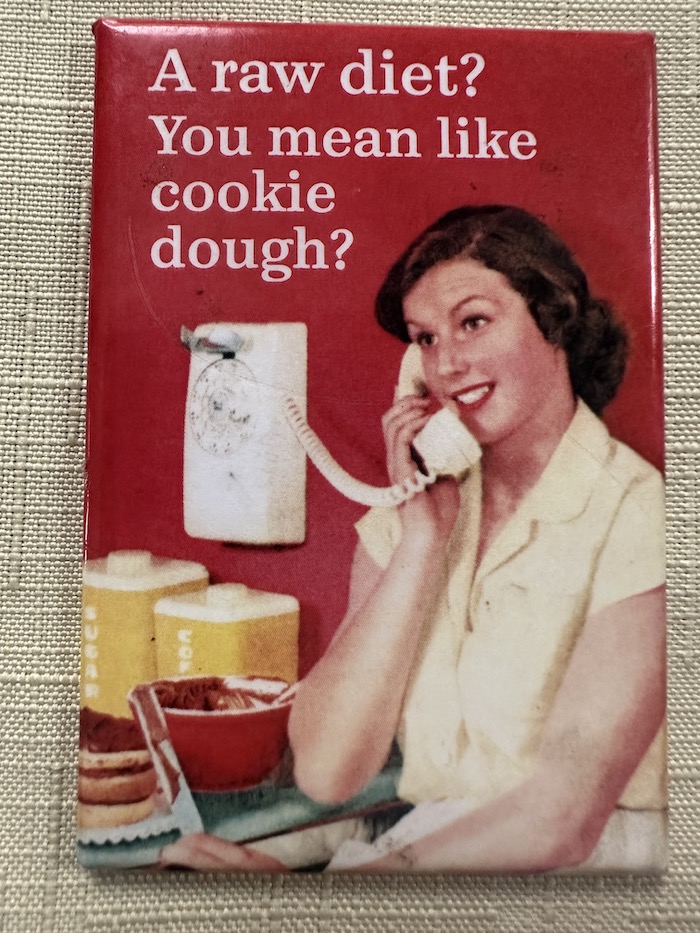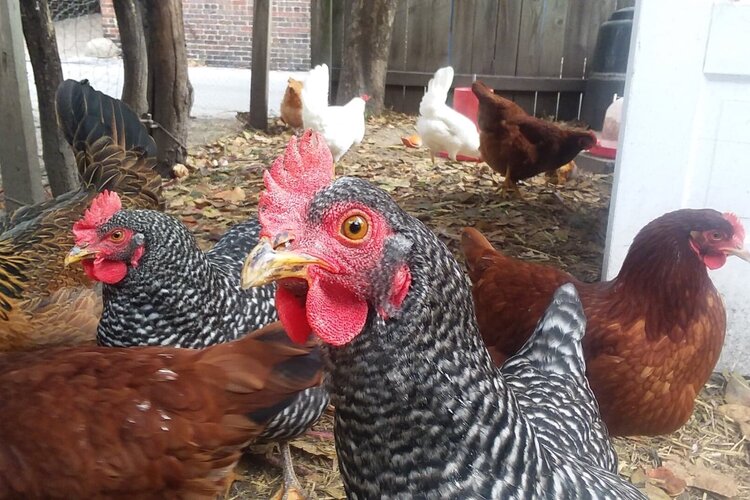Dear Friends,
Here’s the line up for this week’s program (LISTEN HERE):
(02:20) The great Antarctic meltdown;
(06:30) Why going vegan won’t solve climate change;
(19:00) Trampling Palestinian freedom in the West Bank;
(27:40) Anti-abortion spokesperson dismisses concerns about mothers’ health;
(37:20) Showdown on student debt;
(45:25) Cell phones under fire for their impact on kids’ health;
(53:55) March garden Q & A, with Kathy Byrnes of Birds & Bees Urban Farm.

Ed’s favorite refrigerator magnet
Veganism. I have nothing against it, nor any other diet, for that matter. Raw. Paleo. Carnivore. Breatharian. Bring it on. It’s your call. Why? Because I believe in freedom (unlike the Republican majorities at the Iowa Statehouse, it seems).
What I have trouble with is the occasional “vegangelical” who calls me a climate hypocrite because my Locavore diet includes meat. Even my favorite mouthpiece of the Mainstream Media, The Guardian, has an entirely lopsided take on the role of animals in agriculture and dining.
The main problem is that many vegan and vegetarian arguments against meat lump large-scale industrial production in with sustainable alternatives. That’s unfair, disingenuous, and actually harmful.
Why harmful? In preparing for this week’s program, I came across an excellent column by author and farmer, Isabella Tree, called If you want to save the world, veganism isn’t the answer. Twenty-three years ago, Tree and her husband transitioned their 3,500-acre grain and dairy farm in West Sussex, England, into a diverse, sustainable system. That farm, which was in decline at the time, is now vibrant and thriving.

Birds & Bees Urban Farm backyard layer flock.
Here are a few key excerpts from Tree’s column, “[G]razing livestock not only provide farmers with an income, but the animals’ dung, urine and even the way they graze, accelerates soil restoration. The key is to be organic, and keep livestock numbers low to prevent over-grazing.”
“Rather than being seduced by exhortations to eat more products made from industrially grown soya, maize, and grains, we should be encouraging sustainable forms of meat and dairy production based on traditional rotational systems, permanent pasture, and conservation grazing.”
“Not only does this system of natural grazing aid the environment in terms of soil restoration, biodiversity, pollinating insects, water quality, and flood mitigation – but it also it guarantees healthy lives for the animals, and they in turn produce meat that is healthy for us.”
“[U]nless you’re sourcing your vegan products specifically from organic, ‘no-dig’ systems, you are actively participating in the destruction of soil biota, promoting a system that deprives other species, including small mammals, birds and reptiles, of the conditions for life, and significantly contributing to climate change.”
“There’s no question we should all be eating far less meat, and calls for an end to high-carbon, polluting, unethical, intensive forms of grain-fed meat production are commendable. But if your concerns as a vegan are the environment, animal welfare and your own health, then it’s no longer possible to pretend that these are all met simply by giving up meat and dairy.”
Thank you, Isabella. On a much, much smaller scale, my wife, Kathy, and I have achieved that same balance on Birds & Bees Urban Farm — our tiny, 1/8-acre farm in Sherman Hill. (According to the USDA, we are indeed a farm.)
With 45 garden plots and some foraging, Kathy and I raise/gather half the food we eat. It’s mostly fruits and vegetables, but our farm simply would not work without chickens. In addition to the high quality protein they provide, our flock’s manure is essential to maintaining soil health.
Key to our mission is to use the layout we’ve designed to teach others how to turn their yards into dinner. That’s a direction more people are heading as concerns about supply-chain disruptions intensify.
Thanks for reading, listening, and taking action. If you appreciate what we do at the Fallon Forum, please consider a donation.
Ed Fallon
*******
CLICK HERE TO LISTEN TO THIS WEEK’S PODCAST
You can also hear the Fallon Forum on these affiliates:
– KHOI 89.1 FM (Ames, Iowa)
– KICI.LP 105.3 FM (Iowa City, Iowa)
– WHIV 102.3 FM (New Orleans, Louisiana)
– KPIP-LP, 94.7 FM (Fayette, Missouri)
– KCEI 90.1 FM (Taos, New Mexico)
– KRFP 90.3 FM (Moscow, Idaho)
– WGRN 94.1 FM (Columbus, Ohio)
– KKFI 90.1 FM (Kansas City, Missouri)
Please support the local businesses and non-profits who make this program possible. Click on their logos on the Fallon Forum website and in our weekly email, and visit Dr. Drake Family Psychiatry, Story County Veterinary Clinic, Bold Iowa, and Birds & Bees Urban Farm. Thanks to Des Moines Irish Session for providing our bumper music. Thanks for supporting the civil alternative to the shock jocks!

Ed Fallon

The problem is hundreds of condos filled with thousands, millions of people that must eat. Even given an acre apiece, if you could find it, they are unable to feed themselves. And given the water needed for processing, it would be a nightmare! Not to mention solid disposal.
So until we shut off the rampant reproduction of mouths to feed, we are stuck. The beef we eat lives on land that will not support crops, only grass. But I remember farms of 50 years ago, 1/4 pasture, 1/4 hay, 1/4 corn, 1/4 beans. The grain was not sold but fed. In the winter cattle grazed the crop ground, cleaning up spillage, and hogs cleaned up cattle droppings. There was little ammonia spread on fields, nor trace minerals. The crops had better nutrition having absorbed trace minerals. Then (a dem I think) someone advocated fence to fence crops…. And resident farmers were bought out by crop farmers. Farms went from 40-300 acres to thousands. This removed rural residents to cities as well, changing everything, including voting patterns…